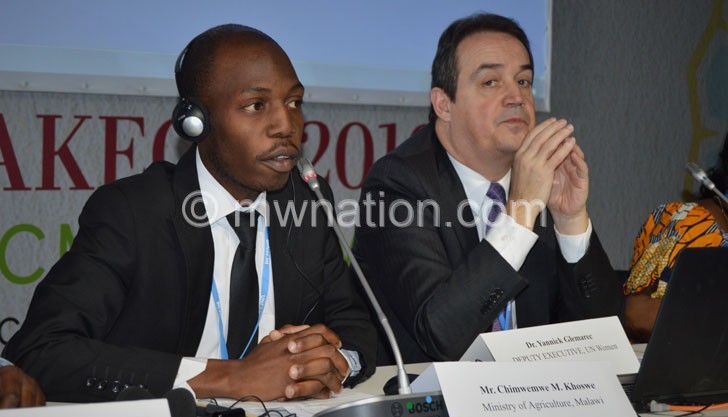Malawi roped in UN Women multi-national project empowering women
Malawi has been roped in a multi-national UN Women climate smart agriculture project aimed at empowering and improving women’s access to agricultural information, among others.
Agriculture remains one of the most important areas of women’s work globally with more than a third of employed women in the agricultural sector. Yet women farmers face a number of key structural barriers that limit their access to land, information, finance, infrastructure, technologies and markets.
The UN Women suggests that closing the gender gap in agriculture through informed investments that remove these barriers represents a huge opportunity for women’s empowerment, economic development and societal resilience.
Speaking at a high level UN Women organized side event on Monday at the on- going COP 22 in Marrakech, Morocco whose focus was ”Transformative strategies for the economic empowerment of women through climate resilient agriculture, Deputy executive of UN Women Yannick Glemarec said women hold key to the growth of Africa’s agriculture.
According to statistics, women comprise some 43 percent of the agricultural labour force in developing countries and in sub-Saharan Africa, this proportion increases to 59 percent of employed women being in informal agricultural employment.
But less than 20 percent of agricultural landholders worldwide are women and only 22 percent of women in low-income countries such as Malawi hold bank accounts in rural areas.
Glemarec added that African women farmers only have five percent access to agricultural information something which reduces their capacity to contribute positively.
“Most agricultural information sent to farmers through extension workers is packaged with men in mind. This is because key factors of production—land, capital and markets—continue to be domains of man,” he said.
It is against this, explained Glemarec, that UN Women found it important to roll out a project that should empower women farmers in Africa.
The first round of the project—which involves Malawi, Rwanda, Mali, Senegal and Democratic Republic of Congo (DRC)—will be launched this year in DRC.
According to the UN Women project document on Malawi titled “Empowering women through a Climate-resilient agriculture” the 5-year Climate Resilient Agriculture Programme will be implemented in six districts of Balaka, Chikwawa, Phalombe, Thyolo, Salima and Karonga.
“These districts have been selected because they experience changing rainfall patterns and higher temperatures that have shortened the growing season. Persistent droughts and floods in these districts are eroding assets, leaving people, especially women more vulnerable to disasters. Rainfall is uni-modal and occurs from November to May which varies from less than 600 mm in the Southern region to over 1,800 mm in the highlands,” reads the UN Women document.
The programme aims to empower 25,000 Malawian women smallholder farmers who have been exposed to the cyclical effects of El Nino/droughts and La Nina/ floods with the aim of strengthening their resilience to climate change by 2021.
The four pillars of the programme are supporting reforms for women farmers’ greater access to and control over land; improved women farmers’ productivity and resilience to climate change; implement initiatives that promote women’s access to financing; and supporting women farmers to move up the agricultural value chain.
During the side event, Malawi was represented by Chimwemwe Khoswe an economist at the Department of Agricultural Planning Services. Khoswe noted that due to the high dependence on rain-fed agriculture Malawi is becoming more vulnerable to climate change impacts.
“It is estimated that on average, droughts cause GDP losses of almost 1% (USD 12.5 million) every year with much greater losses for extreme droughts .The direct cost of droughts and floods taken together is about 1.7% of Malawi’s GDP,” he said.
He pointed out that recently Malawi has developed a National Agriculture Policy and has also reviewed its policy and legal framework around climate change and disaster risk management.
“These legislative pieces will be strategic in programming and ensuring that women’s resilience to climate change is strengthened and that they are able to increase their productivity and incomes in the context of a changing climate,” he concluded.





